Anatomy of an Era: Aaron Graham, Part 3
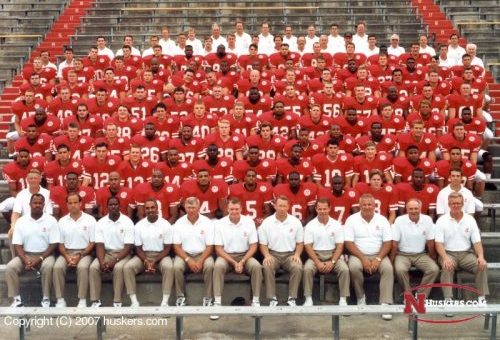
Excerpted from Chapter 94, No Place Like Nebraska: Anatomy of an Era, Vol. 2 by Paul Koch
Anatomy of an Era: Aaron Graham, Part 3
Q: (laughs) Any one game stand out to you more than another from your whole collegiate career? And if so, for what reason?
AG: For me there were so many good battles. You might want to go back and check the record, but when we were either 1 or 2 and Colorado was like 1 or 2 when we played them in Memorial Stadium in ’94. Of their eleven defensive starters… of those who started, ten of those guys started in the NFL.
Q: Wow!
AG: And that was as intense a game as any outside of the Orange Bowl.
And a quick story… that helps to understand the thinking of that time: among the offensive line that year, we had as a group, we’d collectively decided -it was kind of a corny deal- that we were going to pull our socks up…
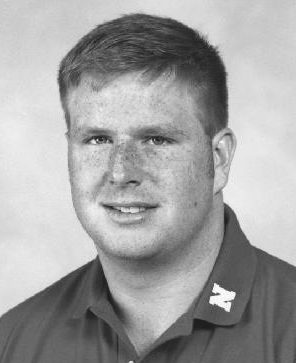
Q: Socks-up Tuesday?!
AG: Yeah, both when we were in practice and in games. And what that symbolized was kind of the old-school uniform, old-school mentality, and that was how we worked and that was how we played.
So the offensive line? We all wore our socks up high and that was our little signature, saying that “We worked our tail off, and now we’re gonna show it off.” And when we got ready for the opening kickoff and we received the ball, when it was our first turn to go on the field, us guys on the offensive line were standing on the sidelines looking across the field. I looked over and their three defensive linemen (they ran a 3-4) –and they looked at us and they all bent down and pulled their socks up! And the finger-pointing and jawing from fifty-three and a half yards across the field? You could have heard it through the stands! And then we huddled three yards away, that was how far we huddled from the defensive team’s players. And then it was, “Game on!” Those first few plays of that ballgame were just as hard-core going at it as you could ever imagine.
Q: Hey, were you the one who would grab the other linemen’s calves or ankles?
AG: Yeah, right. That was between all of us. That was when we got down in the huddle, as a way of reaching over to your buddy. For me it was Brenden Stai and Joel Wilks, grabbing their calf and they’d grab mine, essentially saying, “I’m right here for you, buddy. I’m right next to you. We’re together.” There are a lot of great memories, a lot of great plays in games where it was a necessity for us to come through as a line: “I’m right there with you and we’re going to get the first down or score a touchdown.”
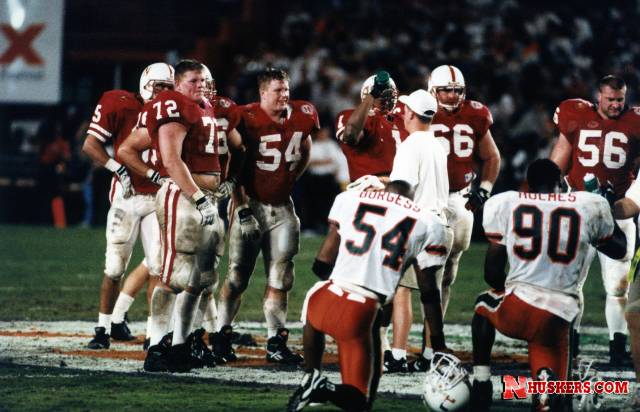
Q: Teamwork. Incredible, Aaron. I think it’s important to delineate that a duality exists: that there are both football ‘teams’ and there are football ‘groups.’ Whereas a ‘group’ is a mere assemblage of players, the term ‘team’ is a special designation that should rightly be reserved for a unified, truly cohesive group who possess specials bonds and spectacular chemistry like you guys held. It seems your time there would epitomize that ‘team’ concept more than most…
AG: Maybe. And it’s arguable, but it may be the best example of a college team that’s ever walked out onto an athletic field.
Q: There’s always the argument of who was better: ’94 or ’95’s team. There is often even the back and forth about those team’s differing talent on the offensive lines. You alone are the link between the two, so I’m interested in your opinion. Where do you side in that argument?
AG: I don’t. (laughs) Statistically, the ’95 line was really better than the ’94 line, but I also know that ’94 line were the pioneers… there was a long line of great offensive linemen who played at the University of Nebraska. Will Shields was the guy we looked at when we were younger. When it is all said and done, he may go down as the greatest offensive linemen who ever played. You might check the statistics, but he played something like fourteen years and he went to twelve Pro Bowls.
Q: Holy Cow!
AG: He may go down as the best offensive linemen who ever played the game. That helped us. He was part of the whole machine, that Pipeline. We had a chance to bring that to life because of all that talent that was around us.
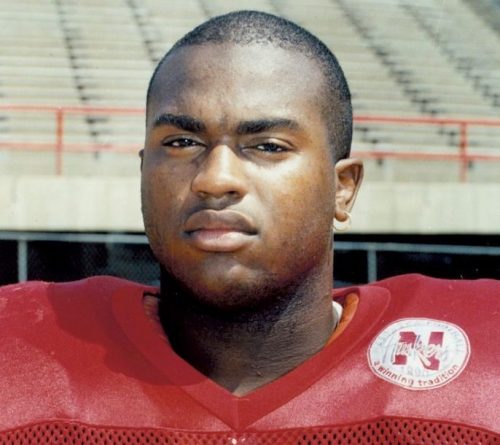
Will Shields
Q: And when you speak about Will Shields, what great effect do you think he may have had on you guys? What was his contribution to the future results?
AG: It was about how you go about doing your business and working every day to get better at your trade, sharpening your tools every day, grabbing your tool belt and getting to work, and you get better. You know Will, he was a very quiet guy when we played together at the University of Nebraska. He had such incredible ability that you just wanted to ‘be like Will.’ All of us wanted to emulate him in some capacity or another. Ironically, the talent that came behind him in that ‘94 line were all very gifted but were all very different, you know? Brenden Stai was forever way stronger than Will Shields had ever been, Zach Weigert was probably a better overall athlete than Will Shields was, but when it’s all said and done I didn’t make a Pro Bowl, Rob Zatechka didn’t make a Pro Bowl, Brenden or Zach didn’t make a Pro Bowl. And here Will made twelve! That’s pretty good. (laughs)
Q: I always recall Will being very quiet. Did he ever say anything of consequence to you guys at all? Anything noteworthy or inspiring that he may have spoken rather than merely acted out?
AG: No, not really. He was really, really quiet. Will was a guy who led with his actions. He never got too emotional either way up or down, he was just a very consistent player. He was an incredibly gifted offensive lineman.
Q: This is one of my favorite questions and almost my last one, Aaron: would there be one person, perhaps behind the scenes, who played a huge role in those teams who maybe has never gotten their due? Does anyone come to mind?
AG: I can think of a couple of them. One of them was Jack Stark, just because Jack brought the ability -or brought the opportunity- through the Unity Council, which he and Coach Osborne formed for us to give the players a voice, which is a big deal. As far as communication from the players to the top level, that was an unbelievable story in and amongst itself. Jack was a big part of just being there every day for us if there was an issue, if someone had something going on or if they had a fight with their girlfriend or whatever, Jack was there to talk about it. Jack gave you the opportunity to be able to visit about things that I don’t think most people would have brought. I think it was an incredible thing to have a guy like him who was a part of our team and allowed the players to express concerns, even if it were something going on like when we were being worked to death, and Jack could make notes and express it to our coaching staff, “Hey, I think the guys need a back-off day to recover“ or “Here’s some suggestions: the guys would prefer to leave on Friday before the game instead of on Thursday like they’ve done in the past.” Coach Osborne was very receptive to what we put together and presented to him.
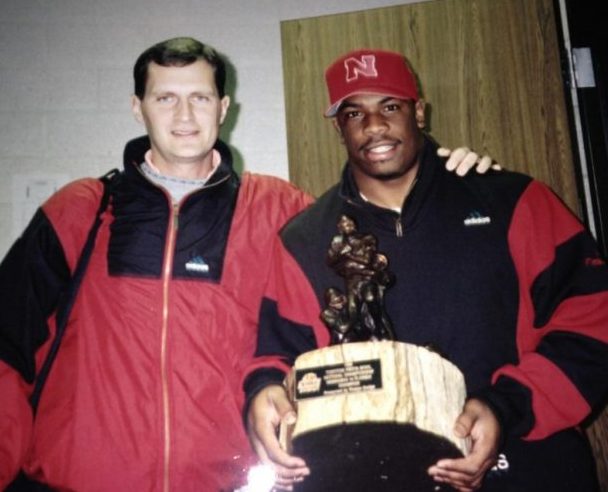
Secondly, the training room staff was a huge key to our success. Doak Ostergard, Jerry Weber and several others. Obviously, George Sullivan. You spent probably the second most amount of time at the stadium with them as you did with the coaches. They were there to help you get on the field, they were there to help heal your injuries, to work with you, to ensure you had every opportunity to be healthy in practices and games. Specifically Doak Ostergard… just another great guy who you could go to share anything with. You’d ask him advice or whatever and he was always there to provide on more of a friend-level giving you advice and direction when you needed it.
Q: Any special off-field memories? It’s easy to forget that you guys were still a bunch of goofy college kids. Is there a memorable, repeatable…?
AG: Repeatable? (laughs) Yeah, repeatable. Oh gosh, I loved the outdoors growing up in Texas and remain a big outdoorsman today. One of my college roommates, Brook Berringer, he introduced me to upland game bird hunting here in the Midwest, hunting and chasing after pheasants and quail. We used to do that and barely make it back for school and practice some days. (laughs) We were so hard core after them.
Some of those opportunities, where we were able to meet the big families who were part of the Husker Nation? Whether it was the mom and dad or aunt or uncle of another teammate, you’d get to go see their family farm and you’d see a lot of the kids who got to play for the state where they grew up. It was really an eye-opening experience for me.
We went back one time to Mike Stigge’s, our punter’s hog farm operation in Washington, Kansas, and my jaw was on the ground: ‘This is really where you grew up?’ And to see how massive it was and how much work was involved on a daily basis: putting on slop boots and walking into the big confinements and watching Mike grab pigs and move them around and vaccinate and whatever, they had to cut a cyst out of one of the hogs, it was one thing after another. It was, ‘Oh my gosh!’ It was crazy. I believe Mike is an Ag Veterinarian today. But to see how he lived his first eighteen years of his life before he attended Nebraska? It was just neat to have those experiences and meet so many different people throughout my career at Nebraska, just great people.
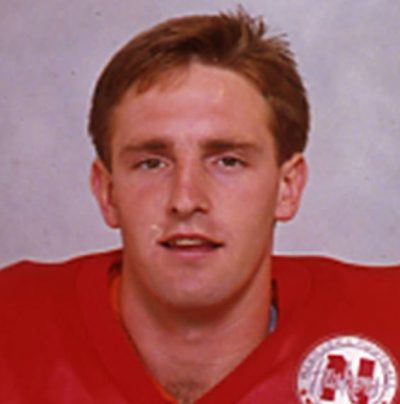
Mike Stigge
Of all my work’s travels that I got to experience after I left Nebraska? My wife and family and I? We settled on living in Nebraska. It truly is the good life. Of all the opportunities in the places I’ve lived in -be it Tennessee or California or wherever- we looked at it and said there were just too many great opportunities and people in the state of Nebraska. That’s where we’ve made our home.
Q: I forgot that Brook was your roommate. Could you share one special memory about him? Anything come to mind worth sharing?
AG: Yep, Brook was not scared to ask anybody permission to hunt their property. (laughs) He’d always ask. And we knew, of course, that we’d never want to get into any trouble for trespassing on somebody’s property. Well, one day we went and asked this one old farmer: Brook and I went to the door to ask if we could walk this draw and see if we could pick up a bird or two, and he kind of refused at first and really wasn’t too keen on the idea. Well, Brook had a way of persuading people into allowing him to go walk in their field, and the next thing you know the guy says, “Well, I guess. I’ve never let anybody go down there and hunt before, but I guess I’ll let you two boys go down there.” So we go down there and we had gotten about halfway through this creek bottom (we were into the quail heavy and we shot maybe three or four birds, chasing a covey) and a guy came blazing in this pickup truck! Blazing across this pasture straight at us!

Available on Amazon.com
He came up and he was one of the biggest guys I’d ever seen in my life! He was probably 6’8”, 6’ 9” 350 lbs and overalls, and he came screaming at us, asking us, “What the heck we were doing on his land?!” He was hollering at us to, “Get the hell out of here!” and he kept coming, and coming. And Brook has this shotgun in his hand and I have mine in my hand, and the guy reached in his pocket… and he was reaching for what could have been -in that volatile situation, who knows?- and Brook pulled his gun and pointed it on him and said, “Don’t make another move.” And the guy took his hands out of his pocket and continued to yell and holler, and Brook calmed him down with a gun pointed at him and said, “The old man at the farm gave us his permission.”
And the guy said, “My dad doesn’t let anybody hunt here!” And finally Brook had convinced him clearly and accurately that we did have permission, and the guy walked away. I couldn’t have gotten out of there any faster! That just proves something about Brook: it was the correct thing to do, because the guy was in the position where he could have come after us… and we had guns in our hands! (laughs) You know? So it was an obviously uncomfortable situation and a frightening situation. I’m not sure if I would have taken the route that Brook did, but looking back, it was the right thing to do because he was coming after us.
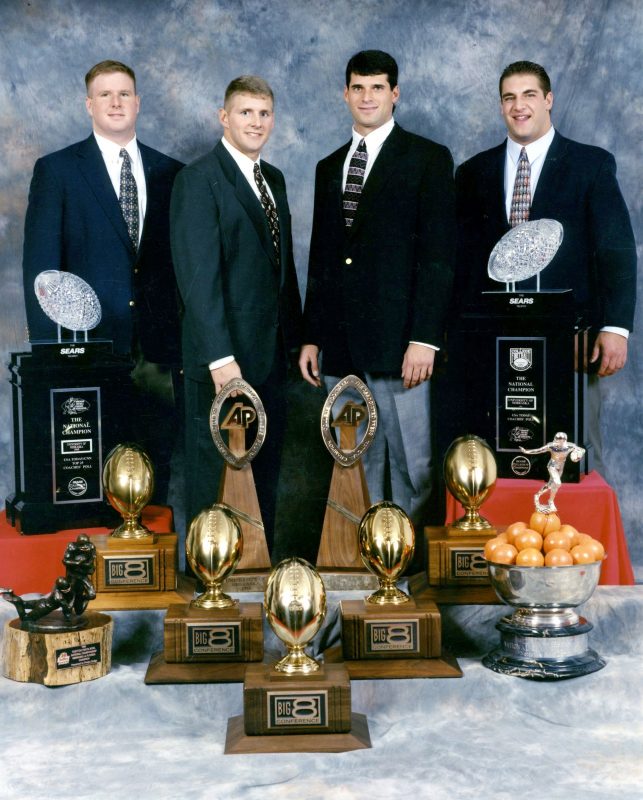
Q: (laughing) Like a rush end crashing down on the pocket, Brook knew how to deal with him, huh?
AG: Yep.
End conversation.
I’ve got something in my craw, and before we go about highlighting this great conversation with Aaron I have to get if off my chest. It has to do with the old, oft-quoted notion that the only reason Nebraska football fans are so rabid, so fully fanatical about the team season after season, is that there is nothing else to do in Nebraska. To that I say, ‘You’re full of it,’ as Aaron pointed out the plentiful array of outdoor pursuits among his real estate offerings. I grew up with a gun in one hand and a fishing rod in the other, spending countless hours reveling in the lifestyle of an outdoor sportsman. Morning to dusk, no matter the season, the stubbled fields and grasslands and the meadows and ponds and streams held a bountiful harvest of sporting beauty, nature rising up and staring you down and leading you around, over and through. The lay of the land is not merely a diversion, but holds an affinity and proximity, taking you in and grounding you to ages old top-soils, clays, limestone, sand and silt. It’s a return to the basics, the simpler ways, the quiet things of unspoiled nature fashioning themselves in splendor right under our very noses, if only we would take a minute of stillness and take notice. Aside and apart from those solemn moments with our old hunting dog or fishing buddy, Nebraska Football, on the other hand, is a most public of the state’s diversions. It’s a spectacle, a coming together, a theater in the round, pregnant with the drama of life and death and rebirth. It’s a mixed bag, for sure. Just don’t say it’s the only bag.
Now, back to our interview’s summary. For starters, I’m intrigued by the number of Husker players who were, to put it bluntly, out-of-state castoffs of a sort. Just recently we heard from the likes of not only Aaron (Texas), but also Christian(New Jersey) and Jared Tomich(Indiana), all players who in some way, shape or form were not valued for their talents in their own home state. I’d like to think the ‘cold shoulder’ they received -and the consequent chips on their own- served as motivation when the day was long, the practice was tough, the training delirious. Christian earlier made mention of someone’s stating the ’91 recruiting class as being the worst ever for Nebraska in the modern era (though I have not been able to substantiate the claim) and I can’t but suspect that this played a major part in attempts to set the record straight and make a point to the contrary. The advent and rise of ESPN’s SportsCenter just prior to this place in time allowed sports coverage to go for once beyond only regional fare, hurling numerous exploits from across the country into each and every living room on a daily, even hourly basis. These MTV Generation kids knew every touchdown, every big sack, every snot-knocking special teams hit would be seen by millions of eyeballs… especially the eyeballs of those who had spurned them previously, in particular. ”What do you think of me now?” could have been their mantra.
Aaron’s heart-rending story of his mother’s passing must have made for a tough go of it. I can’t fathom his grief at that young age, when the whole world is still somewhat topsy-turvy and not fully figured out quite yet. Even so, from the day he arrived on campus you knew this kid had a goal, a drive, a self-determination that destiny was fully under his controls. Rarely doubting his capabilities as a contributor, Aaron was a study in leadership and teamwork. I was tickled by his mention of the unspoken communications in the huddles when the game was on the line: “That was between all of us… reaching over to your buddy… grabbing their calf and they’d grab mine, essentially saying, ”I’m right here for you, buddy. I’m right next to you. We’re together…I’m right there with you and we’re going to get the first down or score a touchdown.” It was that PMA: Positive Mental Attitude. Driving the point home, I was fortunate to run into Dr. Jack Stark in an airport the other day, and we reminisced about the linemen’s attitudes during that time. Jack put it succinctly when he said, “These days it’s all about style. Not the guys back then, though. They didn’t only want to win, to score, they wanted to hurt you!” What’s the old saying? “Your attitude determines your altitude”? Well, Aaron and the Pipeline had all the right stuff.
Notable quote #2:
Aaron Graham on the team’s quest for the best: “The great thing was that the guys who I played with had the same drive and desire to practice harder than anybody, work harder than anybody, and be the absolute best that we could be.”
Copyright @ 2013 Thermopylae Press. All Rights Reserved.
Photo Credits : Unknown Original Sources/Updates Welcomed
Author assumes no responsibility for interviewee errors or misstatements of fact.